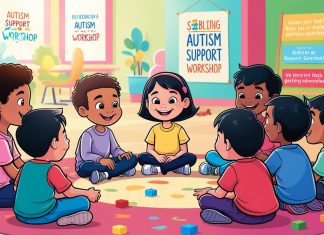Imagine a world where every child, regardless of their unique abilities, has access to the support and services they need to thrive. This is the vision behind autistic children’s services, which play a vital role in enhancing the lives of individuals on the autism spectrum. In this article, we will explore the characteristics of autistic children, the challenges they face, and the importance of specialized services in helping them reach their full potential.
Introduction
Autism, also known as Autism Spectrum Disorder (ASD), is a neurodevelopmental condition that affects individuals’ social interaction, communication skills, and behavior. Autistic children often exhibit unique characteristics such as difficulty in socializing, repetitive behaviors, and sensory sensitivities. Understanding these aspects is crucial for providing effective support and services to autistic children.
Understanding Autistic Children
Characteristics and Behaviors of Autistic Children
Autistic children may display a wide range of characteristics and behaviors. Some children might struggle with social cues, finding it challenging to initiate or maintain conversations with others. They may also exhibit repetitive behaviors, such as hand-flapping or rocking back and forth, which can provide them with a sense of comfort. Sensory sensitivities are also common among autistic children, with certain sounds, lights, or textures being overwhelming for them.
Challenges Faced by Autistic Children
Autistic children face various challenges that can impact their daily lives. Difficulties in social interaction and communication can lead to feelings of isolation and frustration. They may struggle to understand non-verbal cues and have difficulty expressing their own emotions. Additionally, changes in routines or environments can cause anxiety and distress. These challenges highlight the need for targeted support and interventions.
Importance of Specialized Services for Autistic Children
Specialized services designed for autistic children are essential in providing the tailored support they require. These services encompass a holistic approach, addressing not only the core symptoms of autism but also the unique needs of each individual. By focusing on early intervention, therapies, and educational strategies, autistic children’s services aim to maximize their potential, promote independence, and improve their overall quality of life.
Autistic Children's Services

Types of Services Available for Autistic Children
Autistic children’s services encompass a wide range of support options. These include early intervention programs, therapeutic interventions, educational services, and community resources. Early intervention services aim to identify and address developmental delays in children as young as possible, promoting better long-term outcomes. Therapies such as Applied Behavior Analysis (ABA), speech therapy, occupational therapy, and sensory integration therapy are commonly used to target specific areas of need. Educational services, both in specialized settings and inclusive classrooms, offer tailored learning environments for autistic children.
Early Intervention and Its Benefits
Early intervention is crucial in supporting autistic children’s development. Research has shown that starting intervention as early as possible leads to better outcomes in areas such as communication, social skills, and behavior management. By providing targeted support during the critical early years, children have increased opportunities to acquire essential skills and reach their potential.
Therapies and Interventions for Autistic Children
Various therapies and interventions have proven effective in supporting autistic children. Applied Behavior Analysis (ABA) is a widely recognized therapy that focuses on behavior modification and skill-building through positive reinforcement. Speech therapy helps improve communication skills, while occupational therapy addresses sensory sensitivities and enhances daily living skills. Sensory integration therapy, on the other hand, helps autistic children manage sensory challenges and develop appropriate coping mechanisms.
Role of Education in Supporting Autistic Children
Education plays a critical role in the lives of autistic children. Specialized schools and inclusive classrooms provide tailored learning environments that accommodate the unique needs of each child. Individualized Education Programs (IEPs) outline specific goals and accommodations to support their academic, social, and behavioral progress. Collaborative efforts between educators, therapists, and parents ensure a comprehensive and inclusive educational experience.
Finding the Right Services
Evaluating the Needs of Autistic Children
Every autistic child is unique, and it is important to evaluate their individual needs comprehensively. This assessment involves considering their strengths, challenges, and goals. Professionals such as psychologists, developmental pediatricians, and speech therapists play a crucial role in assessing the child’s needs, helping families navigate available services effectively.
Researching and Selecting Appropriate Services
Researching and selecting the most appropriate services for autistic children can be overwhelming. Families can seek recommendations from healthcare professionals, autism support organizations, and other parents in similar situations. It is important to consider the qualifications and experience of service providers, the evidence base supporting their approach, and the compatibility of services with the child’s needs and family dynamics.
Collaboration Between Parents, Educators, and Professionals
Collaboration between parents, educators, and professionals is key to ensuring the effectiveness of autistic children’s services. Open and regular communication helps establish shared goals, strategies, and progress monitoring. By working together, parents and professionals can create a supportive network that optimizes the child’s progress and overall well-being.
The Impact of Autistic Children's Services

Positive Outcomes of Specialized Services
Specialized services for autistic children have demonstrated numerous positive outcomes. Through early intervention and targeted therapies, children can develop communication skills, improve social interactions, and gain essential life skills. These services also contribute to reducing challenging behaviors, increasing independence, and enhancing overall quality of life.
Empowering Autistic Children and Their Families
Autistic children’s services empower both the children and their families. By providing support, resources, and strategies tailored to the child’s needs, families can navigate challenges more effectively. They gain knowledge, skills, and confidence in supporting their child’s development, fostering a positive and inclusive environment at home and in the community.
Advocacy for Inclusive Communities
Autistic children’s services also play a crucial role in advocating for inclusive communities. These services help raise awareness and understanding of autism, promoting acceptance and support in various settings such as schools, workplaces, and public spaces. By fostering inclusivity, society can create an environment where autistic individuals can thrive, contribute, and be valued for their unique strengths.
Conclusion
In conclusion, autistic children’s services are indispensable in supporting the development and well-being of children on the autism spectrum. By understanding the characteristics of autistic children and the challenges they face, we can appreciate the significance of specialized services. From early intervention and therapies to inclusive education and community support, these services empower autistic children and their families, leading to positive outcomes and the promotion of a more inclusive society.
FAQs
FAQ 1: How early should interventions start?
Early interventions should ideally begin as soon as developmental delays or atypical behaviors are observed. The earlier the interventions, the better the chances of positive outcomes. Early identification and intervention offer critical opportunities for maximizing a child’s developmental potential.
FAQ 2: Are these services expensive?
The cost of autistic children’s services can vary depending on factors such as the type of service, location, and insurance coverage. While some services may have associated costs, there are also resources available through public agencies, nonprofit organizations, and insurance coverage that can help alleviate financial burdens.
FAQ 3: Can autistic children attend regular schools?
Yes, autistic children can attend regular schools. Inclusive education promotes an environment where children with diverse abilities learn together. However, individualized support and accommodations may be necessary to ensure their success and well-being in the classroom setting.
FAQ 4: What role do parents play in the process?
Parents play a crucial role in the journey of supporting their autistic child. They are advocates, decision-makers, and partners in the selection and implementation of services. Active involvement, open communication, and collaboration with professionals help create an effective support system.
FAQ 5: How can communities support autistic children?
Communities can support autistic children by promoting acceptance, understanding, and inclusion. Creating inclusive environments in schools, workplaces, recreational facilities, and public spaces ensures that autistic children have equal opportunities to participate, thrive, and be valued for their unique abilities.



























